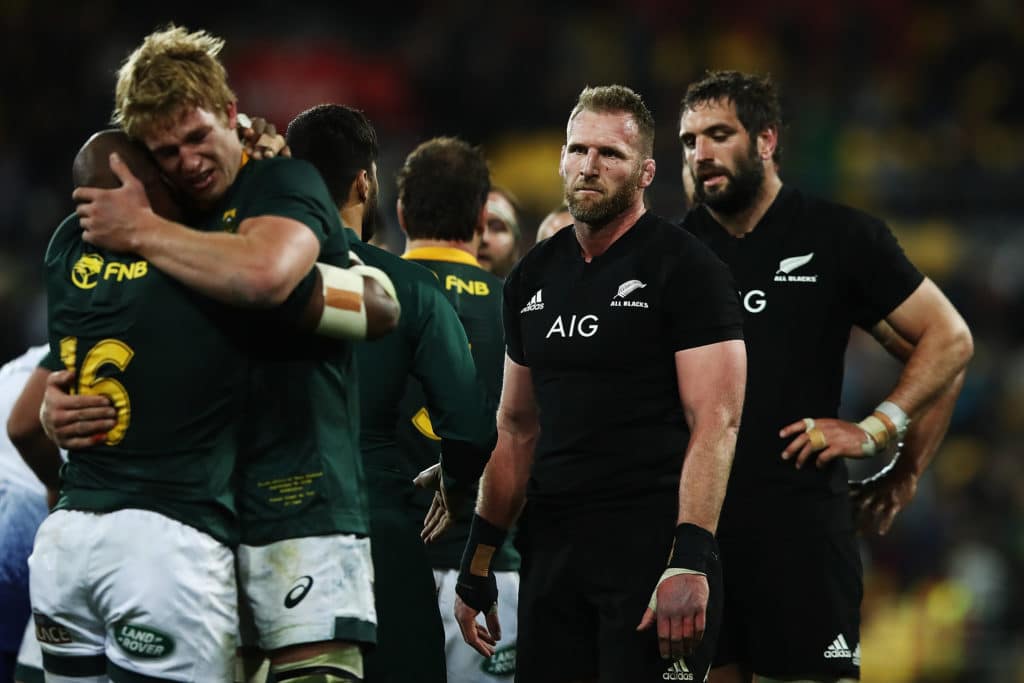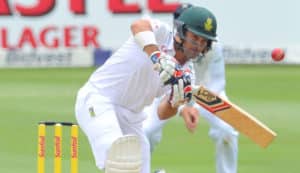The win in Wellington was a triumph in isolation as well as a timely reminder of the Springboks’ latent powers a year out from the World Cup, writes JON CARDINELLI.
Whatever happens over the next 12 months, nobody can take this achievement away from the Bok players and coaches.
They have become only the fourth South African side to slay the All Blacks in New Zealand during the professional era. They have become only the second Test side to outmuscle, outwit and outlast the home team in New Zealand since 2009.
In that sense, we should hit pause on the analysis for the time being and celebrate the result for what it is: something extraordinary that shouldn’t be forgotten any time soon.
ANALYSIS: Bok power game rattled All Blacks
The reaction of the players at the final whistle was telling. These days, a win in New Zealand is akin to a win in a World Cup final. The All Blacks have won 54 out of 57 Tests at home since the start of the 2010 season.
Pieter-Steph Toit shed tears out of exhaustion and elation after the final whistle. The image of the big man weeping and grabbing teammate Bongi Mbonambi in a fierce embrace should be framed alongside any shot of the scoreboard.
Kieran Read glared at the Boks as they celebrated, although his expression could well be interpreted as one of disappointment and shock. This All Blacks side – stacked with 2011 and 2015 World Cup-winning veterans – doesn’t make amateurish errors, and for nine long years, it didn’t lose a single match to the Boks at home.
It was a contest in which the Boks rediscovered their fearsome identity as the brutes and bullies of world rugby. In doing so, they were able to claim a result that will force everyone – South Africans, New Zealanders and neutrals – to reassess what they believe to be true about the game.
The British & Irish Lions took the All Blacks to that dark and uncomfortable place when they toured New Zealand last year. The composite side from the northern hemisphere beat the All Blacks in Wellington to shatter the perception of New Zealand invulnerability.
PLAYER RATINGS: Dyantyi, Kitshoff rock for Boks
They drew the final game in Auckland to level the series. It wasn’t a great outcome for the All Blacks, yet everyone outside of New Zealand agreed that it was an important result for a sport that had been dominated by one side for too long.
The Boks’ win in Wellington was significant for a number of reasons. Earlier in the week, Rassie Erasmus suggested that his future as Bok coach hinged on the players’ performance, and perhaps even the result, at the Cake Tin. Some joked that this bizarre statement could be taken as a resignation, given the All Blacks’ awesome record at home and the Boks’ struggles in New Zealand for the better part of the decade.
Following the recent result, however, nobody should question Erasmus’ right to the job. Erasmus has joined an elite club of Bok coaches who have won in New Zealand during the professional era. Nick Mallett’s side did it in 1998 while Peter de Villiers’ team did it in 2008 and 2009.
The performance itself was a statement, in the context of where the Boks are in 2018 and where they may be come the 2019 World Cup.
As was the case in the first two Tests against England in June, the Boks succeeded in marrying their traditional strengths with an innovative attacking plan. The forwards took the fight to their New Zealand counterparts as if there was no tomorrow – and perhaps Erasmus had given them this message beforehand.
There’s been a lot of talk about the Boks’ regaining their physical reputation this year, even among the coaches and the players. On Saturday, the Boks delivered their most physical performance of the past three seasons.
ALSO READ: Five takeaways from past weekend
The Boks missed a lot of tackles over the course of the game and they allowed the All Blacks too much territory in the second stanza. The physicality and belief of the visitors, however, never faltered.
The confidence and decision-making of the backs, who it has to be said had the benefit of an excellent forward platform, was sublime. Handré Pollard and Elton Jantjies took some excellent options and the Boks troubled the All Blacks in the wider channels. Aphiwe Dyantyi’s finishing was world-class.
Many a Bok side has fallen short against the All Blacks in the past because it has failed to translate forward dominance into tries and points. On Saturday, the Boks put five tries and 36 points the All Blacks. Even if they had lost at the end, that performance, as well as those telling stats, would have echoed through to the 2019 World Cup.
Which brings us to the subject of the heavyweight clash between the teams in the first Pool B match in Yokohama on 21 September next year.
When I interviewed former Bok captain John Smit in a recent edition of SA Rugbymagazine, he said that the current team desperately needed to beat the All Blacks. Smit said that this would give the side reason to believe that a win against the All Blacks during the pool phase of next year’s tournament was possible.
The victory against the All Blacks in Wellington would have done wonders for the Boks in this respect. The result was a triumph in isolation. A massive box has been ticked in the context of the preceding nine years.
FEATURE: How the Springboks can beat the All Blacks
But just as one chapter of the great rivalry has ended, another has begun. One would hope that the current side views the performance and result in Wellington as the start of a new and possibly even greater story, and that they continue to build and evolve over the next 12 months.
Indeed, while the Boks were deserved winners in Wellington, they were less than accurate in several departments. That there is a lot of room for improvement after a monumental win in New Zealand and a performance that yielded five tries and 36 points is an encouraging thought.
Photo: Hannah Peters/Getty Images





